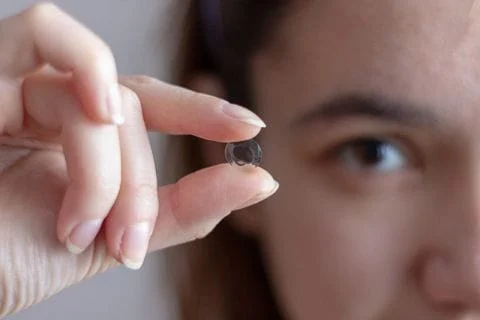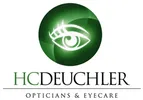
Many patients with vision problems heartily embrace the idea of enjoying vision correction without having to wear eyeglasses or contact lenses. Not all of these patients, however, are good candidates for PRK or Lasik surgery, the two standard surgeries used to alter the way the cornea of the eye refracts light. If that describes you, don't fret -- because here at H.C. Deucher Opticians & Eye Care, we offer an advanced corneal reshaping technique known as orthokeratology, or Ortho-K. This non-surgical technique can produce changes to the way your cornea refracts light.
To understand the benefits of Ortho-K, let us first consider how the cornea works. The cornea is a transparent, spherical bulge that sits over the lens of your eye. In addition to protecting the inner parts of the eye, the cornea also performs some lens-like tasks of its own. The shape of cornea causes incoming light rays to be refracted, or bent, in such a way that the lens can focus them into a clear, sharp image before they pass on to the retina and optic nerve. Ultimately, the optic nerve transmits the image to your brain.
Deformations in the shape of the cornea cause refraction to go wrong in various ways, producing the fuzzy images characteristic of nearsightedness, farsightedness, and astigmatism. Glasses and contact lens are curved to "pre-refract" incoming light to compensate for your personal degree of corneal deformation. Laser surgery actually corrects the shape of cornea itself, eliminating most of all of the visual errors that might otherwise call for corrective lenses.
Corneal Reshaping While You Sleep
While you might leap at the thought of permanently correcting vision problems, laser surgery isn't always the best eye care option. For instance, if you suffer from thin corneas, untreated cataracts, diabetes, certain autoimmune diseases, or a corneal disease called keratoconus, you should avoid laser eye surgery.
Some of our patients simply don't like the idea of any kind of surgery, or they want a reversible procedure. Orthokeratology may be an ideal choice for these individuals. Dr. Maria Domingues will map the shape of your corneas precisely and then fabricate special contact lenses. Unlike standard contacts, you'll wear these lenses at night. The lenses perform a subtle corneal reshaping as you sleep, meaning that you can take them out the next morning and enjoy perfect or near-perfect vision.
Ortho-K can help you see clearly for one or two days at a time, or possibly even longer. By wearing them regularly at night, you can maintain your clarity of vision for as long as you decide to continue using them. If you decide to use another form of vision correction, simply stop wearing the Ortho-K lenses and your corneas will assume their previous shape once again.
Ortho K for Myopia Control
Our team of doctors at H.C. Deucher Opticians & Eye Care boasts extensive experience in the practice of orthokeratology. This technique stands as a leading non-surgical method for correcting eyesight issues, primarily aimed at addressing nearsightedness (myopia). Orthokeratology, often abbreviated as ortho-k, gained overnight wear approval from the Food and Drug Administration in 2002, marking a significant milestone. Despite its longstanding presence, many remain unaware of its comprehensive benefits and operational mechanisms.
Ortho-k involves the use of rigid gas permeable contact lenses, commonly referred to as RGPs or molds, which are notably larger than conventional lenses. These specialized lenses are worn exclusively during nighttime to reshape the eye, resulting in enhanced visual acuity during the day. Moreover, they exhibit greater durability and resistance to deposit buildup. Adjusting to these molds may require a few weeks, unlike the quicker adaptation period of soft contacts, and initial comfort levels might not match those of soft lenses. Although the molds can be utilized for up to a year, regular cleaning remains imperative.
The distinctive feature of ortho-k is its nighttime wear, allowing wearers to enjoy clear vision throughout the day without the inconvenience of eyeglasses or contact lenses. Dr. Maria Domingues first started fitting her patients with Ortho-k in 2013 and quickly realized the benefits for her patients especially her younger patients looking for an option for myopia control. Research, such as a 2017 study on myopia progression (https://www.ncbi.nlm.nih.gov/p...), has underscored the effectiveness of overnight molds in slowing down the advancement of myopia over extended periods. By impeding the elongation of the eye, ortho-k lenses contribute to curbing myopia progression.
Determining eligibility for orthokeratology necessitates a consultation with Dr. Maria Domingues or one of her associates. While many individuals with myopia or astigmatism qualify for this treatment, a professional diagnosis is essential. Initial assessments involve utilizing a corneal topographer to meticulously map and measure the corneal surface, facilitating the customization of lenses tailored to each patient's unique eye characteristics.
The design process for the individualized RGP lens relies on the detailed corneal map generated by the corneal topographer, which captures the intricate features of the cornea's shape and curvature. Following the removal of the RGP lenses, the cornea temporarily retains its reshaped form, offering clear eyesight sans corrective eyewear. However, inconsistent use of ortho-k lenses can lead to a return of myopic vision over time.
Orthokeratology has a rich history dating back to the 1940s, evolving into the advanced procedure it is today. Initially developed to alleviate issues with traditional rigid contact lenses, ortho-k technology has undergone significant advancements, providing a reliable method for myopia control.
Whether opting for orthokeratology or exploring alternative vision enhancement solutions, Dr. Maria and the team at H.C. Deucher Opticians & Eye Care are committed to providing trustworthy guidance and support throughout your journey to improved vision.
Some answers to common questions
Which brand of lenses do we use?
In our office, we offer Paragon CRT Contact Lens treatment, which has shown remarkable results, with 87% of wearers reporting meeting or surpassing their expectations according to a Paragon randomized study. Ortho-k effectively corrects myopia, hyperopia, and astigmatism in the majority of cases, aiming for 20/40 vision or better.
How long does it take to work?
Ortho-k's effects begin almost immediately, with noticeable improvements within days, but it may take up to four weeks for vision to stabilize throughout the day. Initially, wearers may feel the lenses, but comfort typically increases over time. Vision correction lasts approximately 24-36 hours after lens removal, provided proper eye care is maintained.
Orthokeratology suits individuals of all ages, especially children prone to myopia onset. Early myopia management with ortho-k not only enhances vision but potentially slows its progression. Unlike surgical options like LASIK, ortho-k offers temporary vision improvement by reshaping the cornea.
What are the benefits of ortho-k ?
Benefits of ortho-k include avoiding surgery, enjoying clear daytime vision without glasses or contacts, and enhanced safety during sports. Furthermore, ortho-k may alleviate discomfort caused by daytime contact lens wear and potentially slow myopia progression, which can positively impact academic performance.
Myopia, or nearsightedness, is a prevalent eye disorder, increasingly affecting populations worldwide. Left untreated, myopia can lead to various eye complications, underscoring the importance of early intervention and management.
How can I get started?
At our office, the ortho-k process begins with a comprehensive eye exam to determine suitability. Custom ortho-k lenses are then crafted based on corneal measurements, ensuring optimal fit and comfort. Regular nightly wear maintains corneal reshaping, providing sustained vision correction.
Common questions about ortho-k address its safety, duration of wear, longevity of benefits, eligible vision problems, and associated costs will be addressed at the comprehensive eye exam. Ortho-k is considered safe with proper hygiene practices and yearly eye exams. It's crucial to wear the lenses for at least eight hours nightly to maximize benefits, and its effects can last for years with consistent wear.

